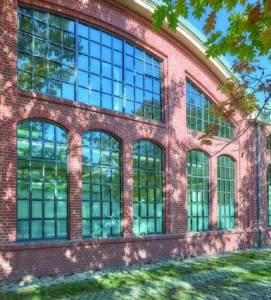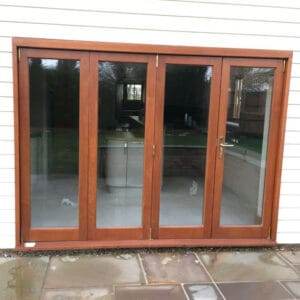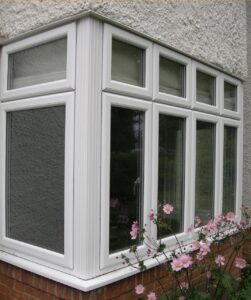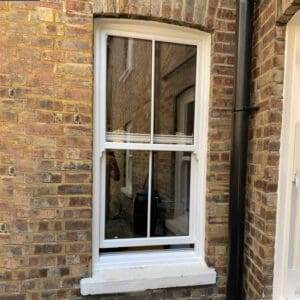Are you facing issues with your aluminium windows at home? Whether it’s a broken frame, faulty lock, or damaged seal, neglecting these issues can lead to security risks and energy inefficiency. However, with the right knowledge and tools, you can easily carry out many repairs on your own, saving you time and money. In this blog post, we will guide you through the process of aluminium window repair, providing you with the necessary steps and tips to ensure your windows are back in top condition.
Key Takeaways:
- Determine the Issue: Before attempting any repairs, thoroughly inspect the aluminium window to identify the root cause of the problem. This can help in ensuring the correct repair method is used.
- Use the Right Tools: When repairing aluminium windows, having the correct tools is crucial. Invest in a good quality silicone sealant, epoxy, and replacement parts if needed to ensure a professional finish.
- Seek Professional Help if Needed: While some aluminium window repairs can be done by homeowners, if the issue seems complex or dangerous, it is best to seek the assistance of a professional to avoid causing further damage.
Assessment of Aluminium Window Damage
When it comes to repairing damaged aluminium windows, the first step is to assess the extent of the damage. This will help you determine the best course of action and the materials needed for the repair.
Identifying Common Issues
Before you begin the assessment, it’s important to familiarise yourself with the common issues that can affect aluminium windows. These may include cracked or broken glass, damaged seals, warped or dented frames, and malfunctioning hardware such as handles or hinges. Identifying these issues will help you to prioritise the repairs and ensure that you have all the necessary tools and materials on hand.
Tools and Materials Needed for Aluminium Window Repair
In order to properly assess and repair damaged aluminium windows, you will need a few essential tools and materials. These may include a screwdriver, pliers, putty knife, glass cutter, sealant, and replacement hardware such as handles or hinges. Additionally, you may need to have access to a level and a caulking gun. It’s important to have all these tools and materials readily available before you begin the assessment and repair process.
By identifying common issues and having the necessary tools and materials at your disposal, you can confidently assess and repair damaged aluminium windows in your home. Understanding the extent of the damage and having the right equipment will allow you to address the issues efficiently and effectively, ensuring the safety and functionality of your windows. Remember to always approach the assessment and repair process with care and attention to detail, as working with damaged windows can pose certain risks.
Step-by-Step Aluminium Window Repair Guide
When it comes to aluminium window repair, it’s important to know the right techniques to ensure the job is done effectively. Here is a step-by-step guide to help you tackle common issues that arise with aluminium windows.
Fixing Aluminium Frame Scratches and Dents
If your aluminium window frame has scratches or dents, you can use a small amount of aluminium repair putty to fill in the damaged areas. Sand down the putty once it’s dry and repaint the frame to match the rest of the window. Remember, deep dents or extensive damage may require professional attention to ensure the structural integrity of the frame.
Replacing Broken Glass in Aluminium Windows
If you have a broken glass pane in your aluminium window, the first step is to safely remove the damaged glass. Carefully measure the opening and purchase a new glass pane of the same size. Apply a thin layer of glazing compound to the window frame, gently press the new pane into place, and secure it with glazing points. Finally, apply a fresh bead of caulk around the glass to seal it in place.
Repairing Aluminium Window Seals and Weather-Stripping
Over time, the seals and weather-stripping on aluminium windows can wear out, leading to drafts and decreased energy efficiency. To address this, you can remove and replace the worn seals with new weather-stripping material. Ensure that the new seals are securely in place to maintain a tight seal and prevent air leakage. This will help improve the energy efficiency of your home and keep your aluminium windows in top condition.
Addressing Operational Challenges in Aluminium Windows
If you are experiencing operational challenges with your aluminium windows, such as difficulty opening or closing them, it could be due to debris buildup in the tracks or worn-out hardware. Clean the tracks thoroughly and lubricate them with a silicone-based lubricant. Replace any worn-out hardware, such as handles or hinges, to restore smooth operation. Addressing these issues promptly will help prevent further damage to your aluminium windows.
Preventive Measures and Maintenance Tips
When it comes to aluminium window repair, the best approach is to prevent the need for repairs in the first place. By taking preventive measures and following maintenance tips, you can keep your aluminium windows in top condition for longer, saving you time and money in the long run. Thankfully, simple routine inspections and care can go a long way in preserving the integrity of your windows.
Routine Inspection and Care for Aluminum Windows
Regularly checking your aluminium windows for any signs of damage or wear can help you to catch issues early on before they escalate. Make it a habit to inspect the frames, seals, and mechanisms for any cracks, leaks, or stiffness. Clean the tracks and lubricate any moving parts to ensure smooth operation. By promptly addressing any minor issues, you can avoid more extensive repairs down the line.
Long-term Preservation Strategies for Aluminum Windows
Another key aspect of maintaining your aluminium windows is to implement long-term preservation strategies to protect them from environmental factors. This includes regularly cleaning the frames and glass, ensuring proper drainage to prevent water accumulation, and applying a protective coating to prevent corrosion. By investing in these proactive measures, you can significantly prolong the lifespan of your aluminium windows and keep them looking and functioning at their best.
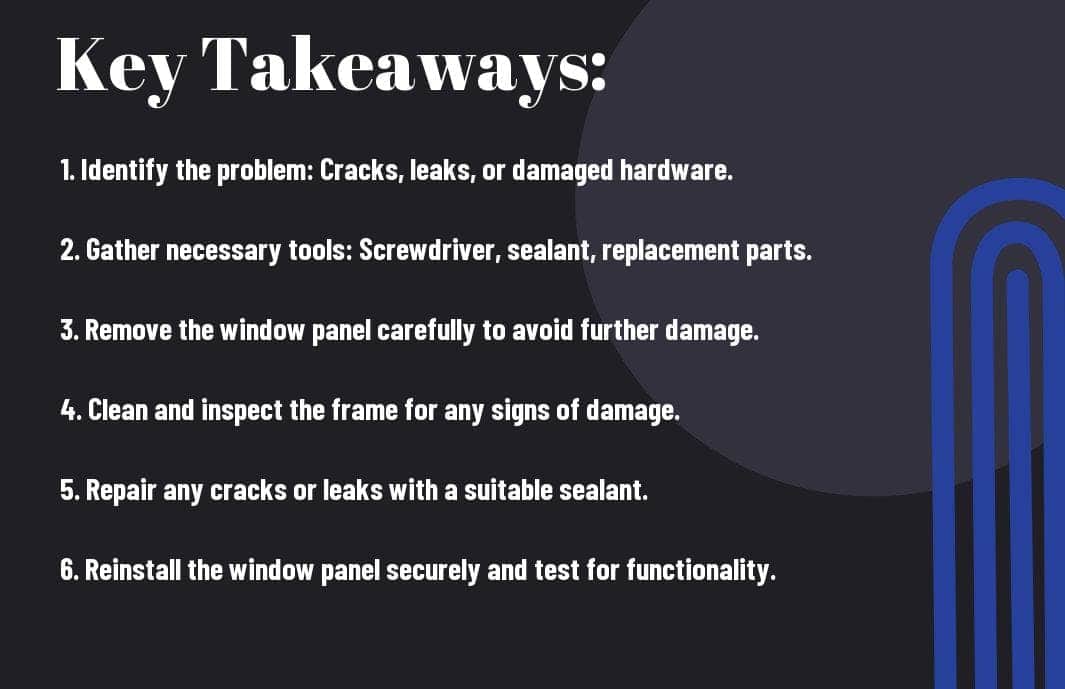
Aluminium Window Repair – A How-To for Homeowners
Taking this into account, you now have a comprehensive understanding of how to repair aluminium windows in your home. By following the step-by-step guide provided, you can confidently tackle any issues that may arise with your aluminium windows. Remember, regular maintenance will help to prolong the lifespan of your windows, saving you time and money in the long run. With these skills in hand, you can ensure that your windows remain in optimal condition, providing security and insulation for your home.
FAQ
Q: What are the common issues with aluminium windows that may require repair?
A: Common issues with aluminium windows include faulty locks, sealant deterioration, draughts, and condensation between panes.
Q: Can I repair aluminium windows myself?
A: Yes, with the right tools and knowledge, homeowners can perform basic repairs on aluminium windows.
Q: What tools are needed for repairing aluminium windows?
A: Tools needed may include a screwdriver, putty knife, silicone caulk, pry bar, and replacement parts like locks or weatherstripping.
Q: How can I fix a draughty aluminium window?
A: To fix a draughty aluminium window, you can replace the weatherstripping, seal any gaps with silicone caulk, or adjust the window’s hinges or locking mechanism.
Q: Is it possible to replace a broken or foggy glass pane in an aluminium window?
A: Yes, broken or foggy glass panes in aluminium windows can be replaced by removing the window sash and installing a new pane.
Q: What should I do if my aluminium window won’t open or close properly?
A: If an aluminium window won’t open or close properly, check for obstructions in the tracks, clean and lubricate the tracks, and adjust the window’s hinges and locking mechanism if necessary.
Q: How often should aluminium windows be inspected for repair needs?
A: It is recommended to inspect aluminium windows for repair needs at least once a year, and more frequently in regions with extreme weather conditions.

